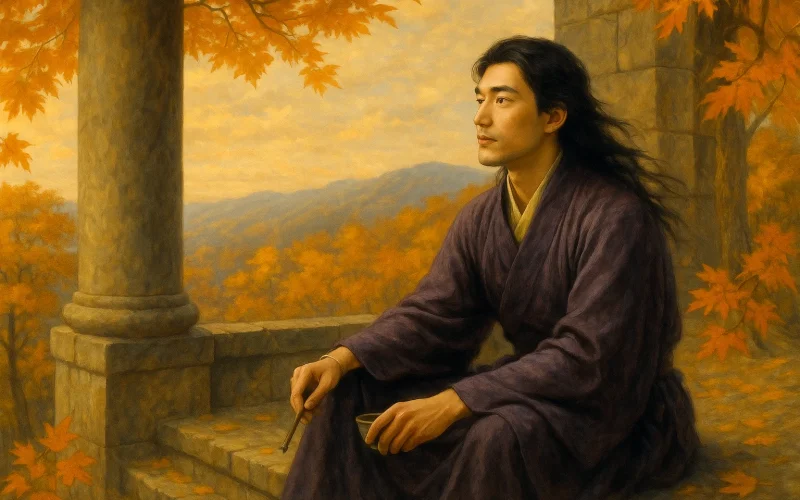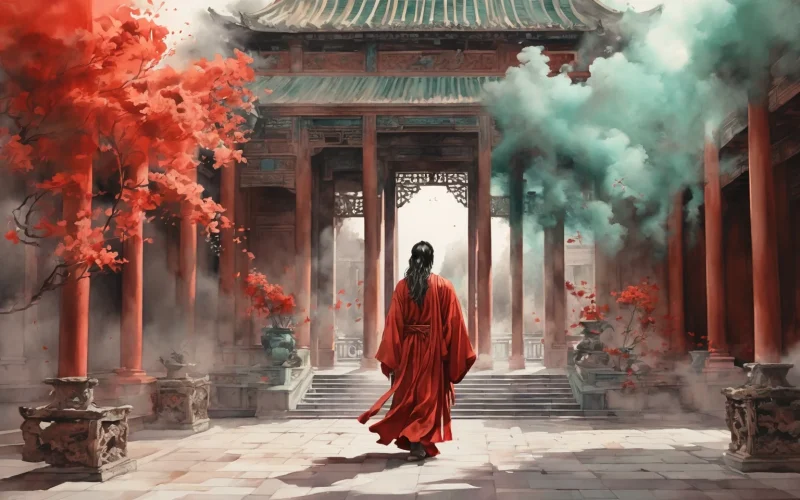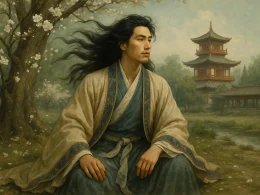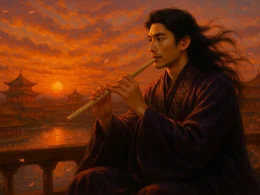Geng Wei (dates of birth and death unknown), a native of Yongji, Shanxi, was a poet during the Dali era (766 - 779) of Emperor Daizong of Tang Dynasty and one of the "Ten Literary Masters of the Dali Period." After attaining the jinshi degree in the imperial examinations, he served as Right Reminder and Dali Judicial Officer, among other positions, and maintained long-term literary associations with poets like Lu Lun and Li Duan in Chang'an. He excelled particularly in five-character regulated verse, characterized by concise language and serene imagery, with over 170 of his poems included in the Complete Tang Poetry collection. Amidst the prevailing austere and desolate style of Dali poetry, Geng Wei distinguished himself with his uniquely subtle and natural literary approach.
Major Works
Life Overview
Though Geng Wei’s exact birth and death dates remain unrecorded, his social circles and career trajectory suggest he was primarily active during the Dali era (766-779). Little is known about his family background, though hints can be gleaned from his poetry.
In his early years, Geng Wei likely lived in seclusion near Mount Song, engaging in farming and study. His line in Spring Day Occasion ("A few acres of land by the eastern marsh; / In youth, I lived alone behind a screen") alludes to Tao Yuanming’s Returning Home ("I climb the eastern ridge to whistle freely") while hinting at his reclusive past. By the time the An Lushan Rebellion (755-763) erupted, Geng Wei was likely already an adult, and the eight-year turmoil profoundly shaped his worldview. His Old Man by the Roadside, with its harrowing depiction of "kin among the bones by the city walls," may reflect firsthand witness of wartime devastation.
In 763, Geng Wei earned the jinshi degree alongside future "Ten Literary Masters" Qian Qi and Li Duan. The civil examinations, scaled back due to the rebellion, were exceptionally competitive at the time, underscoring his scholarly prowess.
After attaining the degree, he was appointed County Captain of Zhouzhi (modern-day Shaanxi), a local security official. During this period, he wrote many poems reflecting postwar hardships, such as Autumn Day:
"The setting sun shines into the village lanes;
Who will share my sorrow when melancholy comes?
No travelers walk the ancient road,
Only autumn wind stirs the crops."
In just twenty characters, he captures the desolation of a war-ravaged countryside.
Later promoted to Left Reminder, a key advisory role in the Chancellery, he served with integrity. Lu Lun’s In Response to Reminder Geng’s Inscribed Gift praises him as "a lucid mind embracing all phenomena," attesting to his upright character and broad-mindedness. He eventually rose to Dali Judicial Officer (rank 6a), overseeing legal cases, though historical records lack details of his administrative achievements.
Poetic Style
Geng Wei’s extant 170+ poems, preserved in the Complete Tang Poems, showcase his artistry in several ways:
Themes: He focused on travel, farewells, and landscapes, particularly postwar scenes. For example, Songzhong ("At dusk, yellow clouds converge; / Over years, bleached bones grow sparse") succinctly conveys war’s scars.
Style: He cultivated a distinctly chilly aesthetic. Compared to High Tang poet Wang Wei’s pastoral idylls (e.g., "Evening glow lights the hamlet; / In poor lanes, cattle return"), Geng Wei’s villages are bleak: "No travelers walk the ancient road, / Only autumn wind stirs the crops." This shift epitomizes the Dali era’s turn toward desolation.
Language: He pursued economy and naturalness, mastering plain description. Lines like "No travelers walk the ancient road, / Only autumn wind stirs the crops" (Ailing in Late Autumn, Sent to Sikong Shu) sketch an autumnal scene in ten stark characters. This approach clearly influenced later poets like Jia Dao.
Literary Legacy
Geng Wei was one of the Ten Literary Masters of the Dali Period, securing a significant place in Tang poetry. He excelled in regulated verse, particularly in five-character regulated verse (wulü), characterized by concise language and serene imagery. Though his poetry did not rely on intense emotion, it was celebrated for its depth within simplicity and melancholy beneath clarity. Later critics praised his works as "pure in theme and boundless in aftertaste," cementing his role as a key figure in the transition toward an elegant, understated style in mid-to-late Tang poetry.
Scholars across generations held Geng Wei in high esteem. Tang poet Lu Lun lauded him as "lofty writing stirring declining tides," recognizing him as a revitalizing force in literature. Ming critic Hu Zhenheng, in Tanyin Guiqian, ranked him among the "second-tier Dali talents," affirming his literary stature. Qing anthologist Shen Deqian included six of his poems in Tangshi Biecai, commenting, "Unadorned yet inherently noble in tone," highlighting how his verses achieved emotional resonance without ornate embellishment.
In literary history, Geng Wei is regarded as a crucial bridge between High and Mid-Tang poetry. His works preserved certain traits of the High Tang while pioneering the emerging Dali style, exerting a profound influence on the evolution of Mid-Tang verse.

























